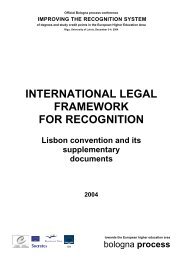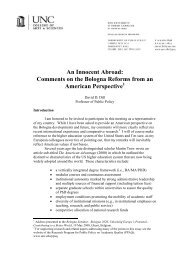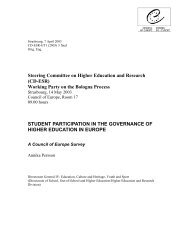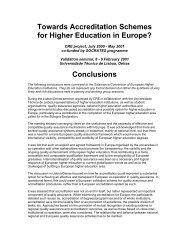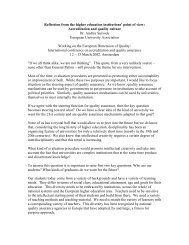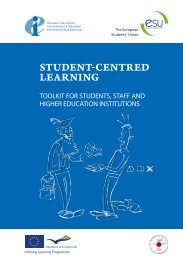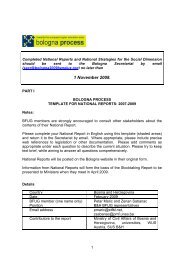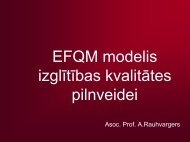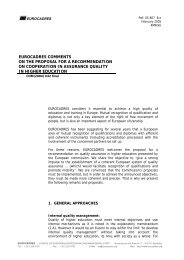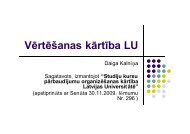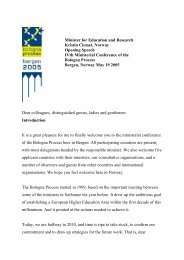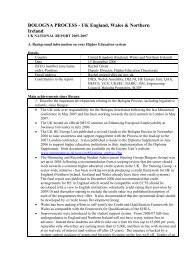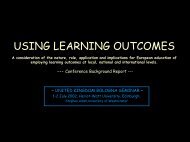EUA Survey Of Master Degrees In Europe - European University ...
EUA Survey Of Master Degrees In Europe - European University ...
EUA Survey Of Master Degrees In Europe - European University ...
Create successful ePaper yourself
Turn your PDF publications into a flip-book with our unique Google optimized e-Paper software.
10The <strong>Master</strong> marketThe second cycle marketplaceBy common consent HE is a social good, whatever its source of funding, and HEIs are accountableto society at large, as well as to their direct funders. <strong>In</strong> many countries a strong public service ethosnevertheless contends with growing pressure to liberalise. Public authorities turn to private capital(family or corporate) to augment state expenditure on HE, in the face of more pressing priorities.Where a private HE sector exists, efforts are made to make it more competitive. OECD, for example,has urged Portugal to de-regulate postgraduate fees, thus shifting some of the financial burdenfrom the public coffers.The Bologna second cycle is a complex marketplace. <strong>Europe</strong> competes with other global regions(witness the ambition of ERASMUS MUNDUS to emulate Fulbright’s record in attracting high-flyingstudents to the US) and countries compete with countries. For-profit and not-for-profit private HEproviders compete with each other and with public HEIs in the search for new services and newclient groups.Moreover, it is in the second cycle that ‘marketisation’ is likely to proceed most rapidly. It is noteverywhere as well supported by public funds as is the first cycle. It offers more opportunity forcommercial exploitation than does the doctorate. The Bruegel report already cited regards thesecond cycle as so strategically important, that it recommends a higher level of public support,complemented by a package of fees, income-contingent loans and bursaries.Such a policy will become more feasible as the autonomy of HEIs grows. <strong>In</strong>dividual institutions will bebetter equipped to specify a mission in line with their target populations and their market position.The configuration of public and private sectors may then change. Public-private partnerships mayincrease in number. Public institutions may be offered the opportunity to become foundations andto exercise greater operational freedom, an evolution already visible in Germany and in Portugal.The social dimensionWould-be mobile students need adequate financial resource. To undertake a <strong>Master</strong> degree in aforeign country requires grant, loan, scholarship, sponsorship, self-financing, or a combination ofthese. This will not change when the 46 Bologna HE systems become interoperable.For any student contemplating a full-time <strong>Master</strong> abroad, there are many factors to consider:admission, cost, value for money, recognition. Each of these is complex. Admission involves not justconsideration of prior learning and experience, but also immigration rules, security procedures andlinguistic competence. The costs of living and tuition have to be considered in the light of loss ofearnings at home and the purchasing power of the home currency in the host country.Value for money depends on duration and quality of course, the perceived prestige of the hostinstitution, the relevance of the qualification to the intended career path, the competitiveness ofthe labour market and the extent to which the postgraduate premium will yield a good return oninvestment.Finally, there is the question of the recognition of the qualification obtained. Is it global, is it goodfor public and private sectors, is it compliant with relevant legislation? <strong>In</strong> the case of studentscontemplating the part-time, executive release or distance <strong>Master</strong>, the issues are not so stark, butstill pressing.Once the student is on course, other questions arise, such as the availability of part-time work, theprovision of careers guidance and work placements, support for family and children. EU studentshave various national safety nets; in all probability, they pay low fees. Non-EU students face problemsof a different order. Women will take longer to repay income-contingent loans than men.61



